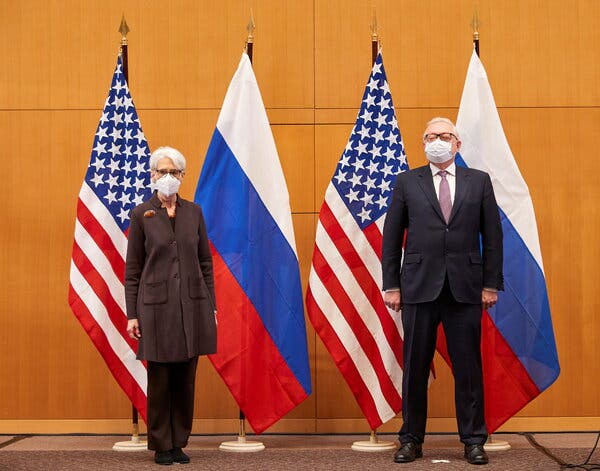
GENEVA — With the threat of Russian military action in eastern Ukraine stirring concern across Europe, American and Russian officials met on Monday to try and find a diplomatic path to ease tensions and avoid the potential for bloodshed.
The official delegations, led by a Russian deputy foreign minister, Sergei A. Ryabkov, and the American deputy secretary of state, Wendy Sherman, sat down at the U.S. Mission in Geneva just after 9 a.m. local time, the State Department said.
Minutes earlier, the police escorted a convoy of black sedans and silver minibuses carrying Russian officials into the sprawling American diplomatic compound on a hill above Lake Geneva.
The talks — the first in a series of discussions that will take place across Europe this week — revolve around the demands for “security guarantees” from Western powers that the Kremlin made in a remarkable diplomatic offensive late last year.
Monday’s negotiations were expected to take up much of the day, with American and Russian officials scheduled to brief reporters separately afterward, in the early evening.
In December, Russia published a proposal for two agreements with the United States and NATO that would roll back Western military activity in Ukraine and elsewhere in Eastern Europe, in essence re-establishing a sphere of Russian influence in what used to be parts of the Soviet Union.
Many of the proposals appeared to be nonstarters for Western officials, who insist that Cold War-style regions of influence are a relic of the past and that countries should be able to choose their own alliances.
But an ominous Russian military buildup near the country’s border with Ukraine that analysts see as a preparation for a potential invasion has seized the attention of the West; the Biden administration agreed to engage with Russia to try to find some common ground.
On Sunday evening, Ms. Sherman met Mr. Ryabkov for a preliminary, two-hour dinner meeting in a nondescript residential building on the Geneva lakefront. “The deputy secretary affirmed that the United States would welcome genuine progress through diplomacy,” the State Department said in a statement.
Mr. Ryabkov described the dinner meeting as “businesslike” and predicted that Monday’s negotiations would not be a waste of time.
Appearing on Sunday talk shows in the United States, Secretary of State Antony J. Blinken said the negotiations could possibly revive the Intermediate Nuclear Forces Treaty, which banned the deployment, in Europe or in Russia, of medium-range nuclear missiles. Both the Obama and Trump administrations accused Moscow of violating the accord, and the United States left the treaty in 2019.
“There may be ground for renewing that,” Mr. Blinken said on ABC’s “This Week.”
But Russia insists that its demands go well beyond arms control, and involve a wholesale redrawing of the security map in Europe, which the Kremlin claims the West forced upon a weak Russia after the collapse of the Soviet Union.
If Russia does not get what it wants, President Vladimir V. Putin said last month, the Kremlin is prepared to resort to military means to achieve its aims.







